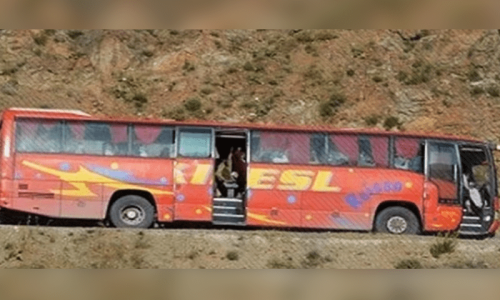BALOCHISTAN’S coalmines are among the world’s deadliest. They claim several workers’ lives every year. The absence of a regulatory framework and safety equipment has increasingly become a catalyst for deadly accidents.
The recent gas explosions in the Sorrange coalmine prove that mining can be a deadly profession. Forty-three workers were killed as a result of the explosions, making it probably the worst mining disaster in Pakistan’s history.
The Pakistan Mineral Development Corporation (PMDC), a subsidiary of the Ministry of Petroleum and Natural Resources, is the owner of the Sorrange coalmines. The area, measuring 1,674 acres, has 12.95 million tons of coal reserves. In 2009-10, it produced 60,404 tons of coal.
Though the Sorrange mines are owned by the PMDC, they are operated by a private contractor on a sub-lease basis. It is standard practice on the part of the PMDC to sublet coalmines to private contractors in order to avoid legal obligations in terms of employment and compensation in the event of death or bodily injury to workers. This is a gross violation of the provisions of the Mines Act, 1923, and the Balochistan Mining Rules, 2002, which do not allow any owner or company to sub-let a mine.
But unfortunately no proper system of checks and balances pertaining to the mining industry is being followed by the Balochistan Mines and Minerals Department, which is responsible for ensuring the enforcement of laws applicable to the safety of mine workers. The recent accident amply demonstrates the failure of the department.
Although modern techniques have been developed in the mining sector, underground coalmining is still considered dangerous, mainly due to the possibility of gas explosions and roof collapses. By not adopting adequate safety measures, workers are exposed to greater dangers which may lead to catastrophes.
Gas explosions are usually caused by the ignition of methane gas because of poor ventilation in the coalmines. Methane is a highly flammable and poisonous gas that usually leaks out during the excavation of coal. If too much gas is trapped in an enclosed chamber and mixes with air in proportions between five to 14 per cent, the results can be extremely dangerous.
It is an unfortunate reality that mine owners place little value on the life of workers. Indeed, coalminers are extremely vulnerable and have a lack of resources to raise a voice for their due rights. It is also not surprising that compensation for coalmining accidents hardly exists. If someone loses his life, that’s the end of the story.
The deteriorating safety situation of mine workers also reflects other socio-economic problems. The majority of workers come from poverty-stricken rural areas and are in desperate need of a job. This is how mine owners take advantage of their economic vulnerability and social compulsions.
Perhaps coalmining is the only lucrative business where no capital investment is required in terms of infrastructure development for the safety and security of workers. Under these circumstances, the future of mine workers in Balochistan seems to be bleak.
The picture of coalmining in Balochistan is very grim. In fact, due to the lethargic approach of state functionaries the situation has gone from bad to worse. The tragic accident at Sorrange points to serious problems including the violation of mining regulations, labour laws and safety standards.
The International Labour Organisation (ILO) is responsible for drawing up and overseeing international labour standards. Due to the hazardous nature of the mining industry, the ILO adopted the Safety and Health in Mines Convention (No 176) in 1995, which prescribes guidelines for bringing about improvement in the working conditions of miners.
Article 4 of the convention requires that members of the ILO should have regulations (a) relating to mine rescue, first aid and appropriate medical facilities; and (b) to provide and maintain adequate self-rescue respiratory devices for workers in underground coalmines.
At present, there is no law in Pakistan to cover the occupational health and safety needs of miners. Although Pakistan did not ratify the aforementioned ILO convention, in the current situation the government should devise a regulatory framework in conformity with the convention for the safety of mine workers.
The legal heirs of the deceased workers are entitled to compensation. In the first tier under the provisions of the Workmen’s Compensation Act, 1923, each worker is entitled to a compensation amount of Rs400,000. But in the second tier, if there is proof of negligence or another wrongful act on the part of the mine owner or agents, there is no monetary limit on the amount recoverable as compensatory damages under the provisions of the Fatal Accidents Act, 1855.
The provincial government, as per routine, has formed an inquiry committee to probe into the accident. But the Pakistan Central Mines Labour Federation has expressed complete dissatisfaction with the government’s action and has demanded a judicial inquiry into the Sorrange coalmine incident. What the investigation will bring forth this time no one knows as past investigation reports have never been made public.
Last year, 33 mine workers were trapped in a deep mine in Chile for over two months. Yet due to persistent efforts they were rescued. Why do we lack such strength and spirit to save our people?
For the prevention of tragic accidents in future, international experts may be called to evaluate the internal situation of the mines and formulate prevention measures specific to their findings to halt mine disasters. There is also a dire need to constitute an independent regulatory authority at the national level to keep a close eye on the mining industry.
The writer is an advocate.











































Dear visitor, the comments section is undergoing an overhaul and will return soon.